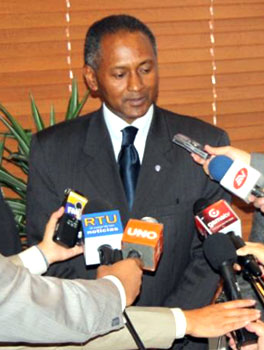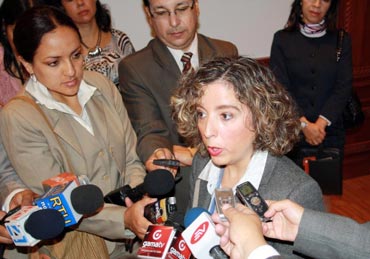UNESCO presents Assessment of Media Development in Ecuador to National Assembly
16-03-2011 (Quito)

Fernando Cordero (left) receiving
the report from Edouard Matoko
© National Assembly of Ecuador
On 15 March the Director of UNESCO’s Office in Quito, Edouard Matoko, presented the report, resulting from the application of UNESCO’s Media Development Indicators (MDI) in Ecuador, to the President of Ecuadorian Parliament, Fernando Cordero.
The Assessment of Media Development in Ecuador 2011 offers a diagnosis of the state of media development in the country, covering the five areas considered by MDIs: the legal framework, radio and television regulation, media pluralism and diversity, capacity building of media professionals, and media infrastructure.
The report reveals the strengths and weaknesses of the Ecuadorian media landscape and concludes with a series of recommendations addressed to different communication actors. These recommendations include the need to:
modernize the legal framework;
de-penalize ‘opinion crimes’;
set up an independent broadcasting regulatory body, free from political and commercial interference;
ensure that any subsequent liabilities for freedom of expression are specific, necessary and explicitly set by a formal law;
ensure editorial and financial independence for public media;
provide equitable access to frequencies to the three media sectors (public, private and community media); and
develop a specific plan for digital migration.
The report also recommends that the media strengthen their self-regulation mechanisms and gives concrete examples of practices that could be introduced in the country. It also calls on media to increase the safety of their journalists and to develop alliances with universities in order to provide life-long training opportunities for their professionals.
The application of MDIs in Ecuador was a participative process and a collective effort that lasted almost two years. The first version of the report was prepared in collaboration with CIESPAL’s research team. This first draft was then revised and enriched by the members of the project’s Consultative Group, made up of representatives of the different communication sectors: journalists’ associations; media owners; universities; private, public and community media; governmental institutions; and civil society organizations. The report had also the support of recognized international experts, who contributed actively to its enrichment.
Mr Cordero expressed his satisfaction with UNESCO’s technical assistance and said he will ensure that the results of this work are used for the current parliamentary processes. Ecuador has been debating a new communications law since 2009. A national public consultation, which will include two questions directly related to communication, is scheduled to take place in May.
The Assessment of Media Development in Ecuador 2011 is available online in English and Spanish.
The report reveals the strengths and weaknesses of the Ecuadorian media landscape and concludes with a series of recommendations addressed to different communication actors. These recommendations include the need to:
The report also recommends that the media strengthen their self-regulation mechanisms and gives concrete examples of practices that could be introduced in the country. It also calls on media to increase the safety of their journalists and to develop alliances with universities in order to provide life-long training opportunities for their professionals.
The application of MDIs in Ecuador was a participative process and a collective effort that lasted almost two years. The first version of the report was prepared in collaboration with CIESPAL’s research team. This first draft was then revised and enriched by the members of the project’s Consultative Group, made up of representatives of the different communication sectors: journalists’ associations; media owners; universities; private, public and community media; governmental institutions; and civil society organizations. The report had also the support of recognized international experts, who contributed actively to its enrichment.
Mr Cordero expressed his satisfaction with UNESCO’s technical assistance and said he will ensure that the results of this work are used for the current parliamentary processes. Ecuador has been debating a new communications law since 2009. A national public consultation, which will include two questions directly related to communication, is scheduled to take place in May.
The Assessment of Media Development in Ecuador 2011 is available online in English and Spanish.

Edouard Matoko, Director of UNESCO’s Office in Quito
© UNESCO
 Rosa Gonzalez, Adviser for Communication and Information, UNESCO Office in Quito
Rosa Gonzalez, Adviser for Communication and Information, UNESCO Office in Quito© UNESCO
Related themes/countries
· Ecuador
· Media Development
· International Programme for the Development of Communication (IPDC)
Share this story:
Contact information
- UNESCO
Source














